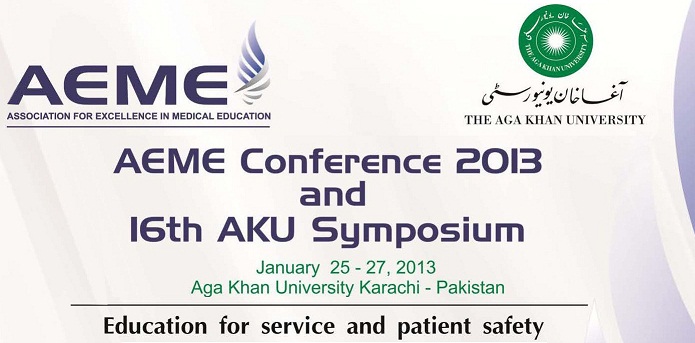Day 1 : Oral Presentations (Theme: Curriculum Innovations)
360-degree evaluation of residents on Communication & Interpersonal Skills; Inter-rater variation in judgment
Location
AKU Auditorium
Start Date
26-1-2013 11:10 AM
Abstract
Background: Effective communication and interpersonal skills are key components for the optimal performance of any health care professional. Developing these skills is an integral part of residency training. Residency programs are adopting various methods to assess how well their trainees can interact with patients and coworkers. We conducted 360-degree evaluations of all our residents to assess their interpersonal and communication skills. The measurement properties of the multi-source ratings were investigated.
Methods: A cross-sectional survey of 49 residents currently enrolled in our Internal Medicine residency program at Aga Khan University Hospital was conducted. Using a 360 degree evaluation technique, every resident was evaluated by eight other co-workers who they had interacted with in the past six months. A self-evaluation was also completed.
Results: We received a total of 367 completed forms for the 360 degree evaluations (response rate of 83.2%). Comparing the mean scores of residents, we found a statistically significant difference between the ratings given by the nurses and the faculty (p<0.01).
Conclusions: The 360 degree evaluation technique is effective for measuring the communication skills of trainees. Individuals who interact with trainees on regular basis can provide meaningful judgments of their abilities. Resident self-evaluations may be prone to error.
Key words: 360 evaluation, communication skills, residents
360-degree evaluation of residents on Communication & Interpersonal Skills; Inter-rater variation in judgment
AKU Auditorium
Background: Effective communication and interpersonal skills are key components for the optimal performance of any health care professional. Developing these skills is an integral part of residency training. Residency programs are adopting various methods to assess how well their trainees can interact with patients and coworkers. We conducted 360-degree evaluations of all our residents to assess their interpersonal and communication skills. The measurement properties of the multi-source ratings were investigated.
Methods: A cross-sectional survey of 49 residents currently enrolled in our Internal Medicine residency program at Aga Khan University Hospital was conducted. Using a 360 degree evaluation technique, every resident was evaluated by eight other co-workers who they had interacted with in the past six months. A self-evaluation was also completed.
Results: We received a total of 367 completed forms for the 360 degree evaluations (response rate of 83.2%). Comparing the mean scores of residents, we found a statistically significant difference between the ratings given by the nurses and the faculty (p<0.01).
Conclusions: The 360 degree evaluation technique is effective for measuring the communication skills of trainees. Individuals who interact with trainees on regular basis can provide meaningful judgments of their abilities. Resident self-evaluations may be prone to error.
Key words: 360 evaluation, communication skills, residents

